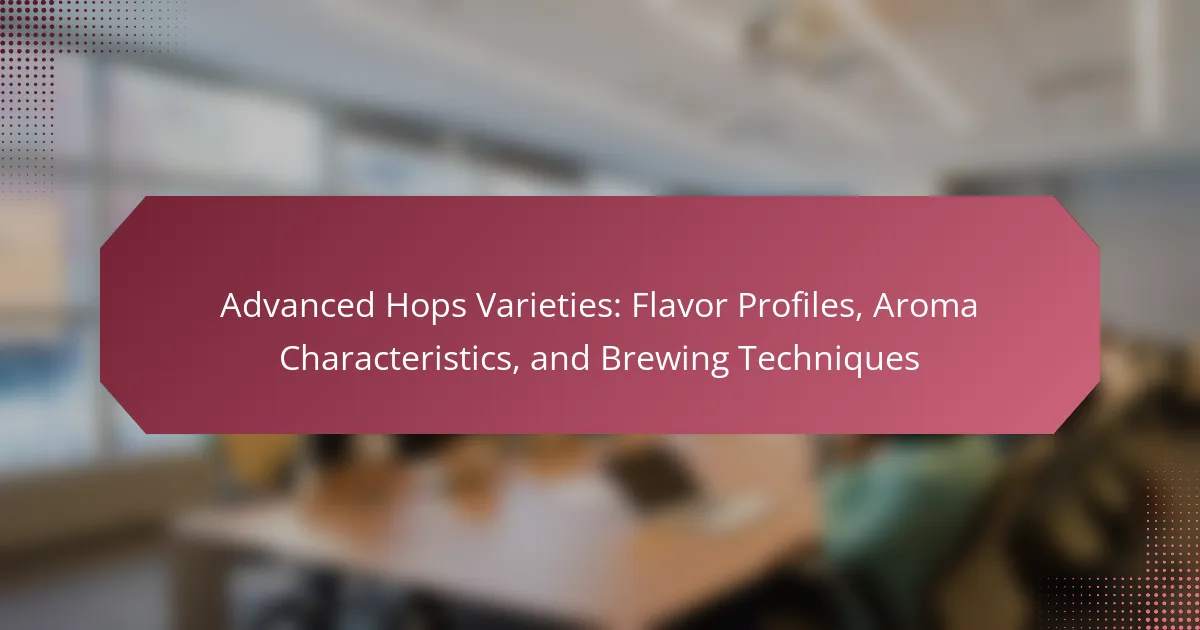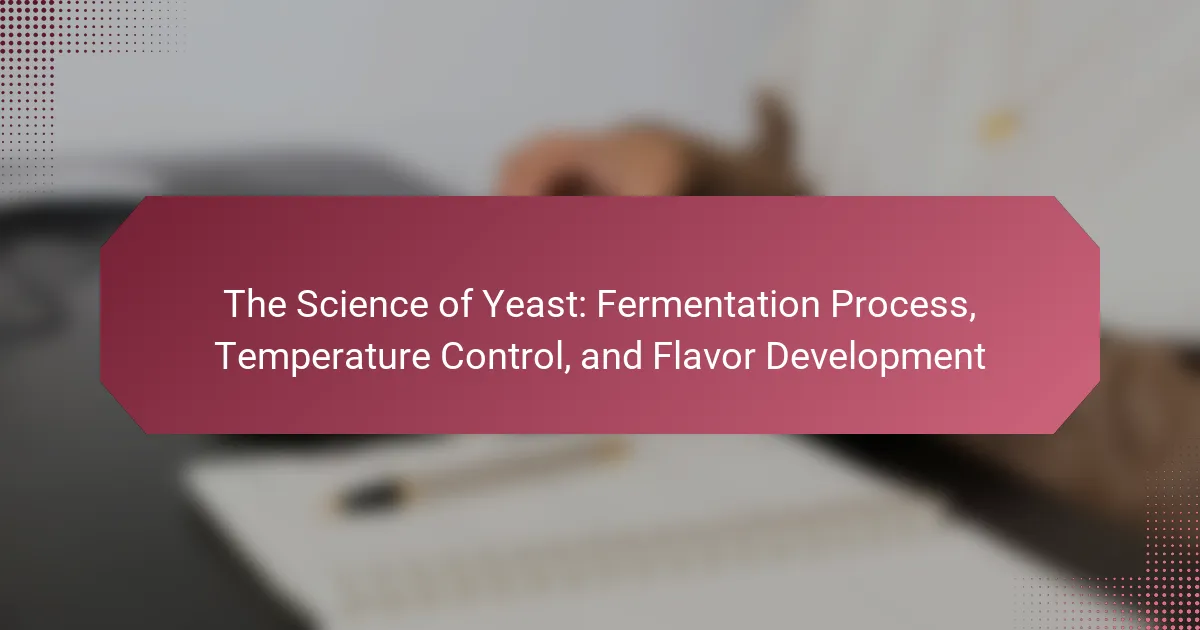Advanced hops varieties are specialized hops developed to enhance the brewing process with unique flavor and aroma profiles. These varieties, including Citra, Mosaic, and Simcoe, offer a diverse range of flavors from fruity and floral to earthy and spicy, thanks to advanced breeding techniques that increase essential oil content. Effective brewing techniques such as dry hopping, whirlpool hopping, and late kettle additions are essential for maximizing the impact of these hops, allowing brewers to create innovative beer styles. Understanding the distinct characteristics of each hop variety and experimenting with combinations can lead to unique brews, while proper storage and handling preserve their volatile oils for optimal freshness.

What are Advanced Hops Varieties?
Advanced hops varieties are specialized types of hops developed for unique flavor and aroma profiles. These varieties often exhibit distinct characteristics that enhance the brewing process. They can provide a range of flavors, from fruity and floral to earthy and spicy. Advanced breeding techniques have led to the creation of hops with higher essential oil content. This results in more intense aromas and flavors in the final beer product. Varieties such as Citra, Mosaic, and Simcoe are examples of advanced hops. These hops are widely used in craft brewing for their innovative contributions. Their development has transformed the beer landscape, allowing brewers to experiment and create diverse beer styles.
How do Advanced Hops Varieties differ from traditional hops?
Advanced hops varieties differ from traditional hops primarily in their flavor profiles and aromatic characteristics. Traditional hops typically offer a more limited range of flavors, often emphasizing bitterness and classic floral or earthy notes. In contrast, advanced hops varieties have been selectively bred to enhance specific flavor and aroma compounds.
These varieties can provide unique profiles, such as tropical fruit, citrus, and even herbal or spicy notes. For example, varieties like Mosaic and Citra are known for their intense fruity aromas, which are not commonly found in traditional hops.
Additionally, advanced hops may have higher concentrations of essential oils, which contribute to their distinct characteristics. Research indicates that these enhanced properties can significantly influence the overall sensory experience of beer.
The development of advanced hops is often the result of crossbreeding and genetic research aimed at improving yield, disease resistance, and flavor complexity. This innovation allows brewers to experiment with new styles and create unique beer offerings.
What are the key characteristics that define Advanced Hops Varieties?
Advanced hops varieties are characterized by unique flavor profiles, enhanced aroma characteristics, and improved brewing performance. These hops often exhibit higher levels of essential oils, which contribute to their distinct scents and tastes. Many advanced varieties have been bred for specific flavor notes, such as citrus, tropical fruit, or herbal qualities. Additionally, these hops may offer higher alpha acid content, leading to more efficient bitterness in beer. Some varieties are resistant to diseases, ensuring better yield and consistency. Research indicates that advanced hops can significantly impact the sensory experience of beer, making them essential for craft brewers.
Why are Advanced Hops Varieties important in modern brewing?
Advanced hops varieties are important in modern brewing because they enhance flavor and aroma profiles. These varieties provide unique characteristics that traditional hops may lack. For instance, advanced hops can introduce new fruit, floral, and spice notes. This diversity allows brewers to create innovative and distinctive beers. Furthermore, many advanced varieties have higher levels of essential oils. This leads to more intense aromas and flavors in the final product. The use of advanced hops can also improve bitterness balance. This is crucial for achieving desired taste profiles in various beer styles. Overall, advanced hops varieties are essential for creativity and quality in contemporary brewing.
What are the primary flavor profiles of Advanced Hops Varieties?
Advanced hops varieties primarily exhibit flavor profiles such as citrus, floral, pine, and tropical fruit. Citrus flavors often include notes of orange, lemon, and grapefruit. Floral profiles can present hints of lavender and rose. Pine flavors contribute resinous characteristics, commonly found in West Coast IPAs. Tropical fruit flavors may feature mango, pineapple, and passion fruit. These flavor profiles result from specific chemical compounds present in the hops. For instance, myrcene is linked to citrus and herbal notes, while humulene contributes to earthy and woody flavors. The diversity in flavor is essential for creating unique beer styles.
How do different Advanced Hops Varieties contribute to flavor complexity?
Different advanced hops varieties contribute to flavor complexity through unique aromatic compounds and flavor profiles. Each variety possesses distinct essential oils that create a wide range of flavors. For example, varieties like Citra are known for their citrus and tropical fruit notes. In contrast, Mosaic hops offer a blend of earthy, floral, and fruity characteristics.
The presence of specific terpenes, such as myrcene and humulene, enhances the overall flavor experience. Research indicates that the combination of these terpenes results in synergistic effects that amplify flavor complexity. Additionally, the timing of hop additions during brewing affects how these flavors develop. Late hop additions maximize aroma while minimizing bitterness.
Overall, the diversity in advanced hops varieties allows brewers to craft unique flavor profiles that appeal to a broad audience.
What are the most popular flavor profiles associated with Advanced Hops Varieties?
The most popular flavor profiles associated with Advanced Hops Varieties include citrus, pine, floral, and tropical fruit. Citrus flavors often feature notes of orange, lemon, and grapefruit. Pine flavors are typically resinous and earthy, providing a robust character. Floral profiles can include hints of lavender and jasmine. Tropical fruit flavors commonly present include mango, pineapple, and passion fruit. These flavor profiles are derived from specific hop varieties like Citra, Simcoe, and Mosaic. Research shows that these hops are widely used in craft brewing for their unique aromatic and flavor contributions.
What aroma characteristics can be found in Advanced Hops Varieties?
Advanced hops varieties exhibit a range of distinct aroma characteristics. Common aromas include citrus, floral, and pine notes. Specific varieties like Citra are known for their strong grapefruit and tropical fruit aromas. Mosaic hops offer a complex profile with berry and earthy undertones. Other varieties, such as Simcoe, provide a mix of citrus and herbal scents. These aroma characteristics significantly influence the overall flavor profile of the beer. Research indicates that the aromatic compounds in hops are crucial for enhancing beer’s sensory experience.
How do aroma characteristics enhance the overall beer experience?
Aroma characteristics significantly enhance the overall beer experience by influencing perception and enjoyment. The sense of smell is closely linked to taste, affecting how flavors are interpreted. Specific aromas from hops, malts, and yeast contribute to the beer’s complexity. For example, floral, citrus, or earthy notes can evoke different sensations and memories. Studies show that aroma can account for up to 80% of flavor perception in beverages. Additionally, a well-rounded aroma profile can create anticipation and enhance the drinking experience. Therefore, aroma characteristics play a crucial role in defining the quality and appeal of beer.
What specific aroma profiles are unique to certain Advanced Hops Varieties?
Certain Advanced Hops Varieties possess unique aroma profiles. For example, Citra hops are known for their strong citrus and tropical fruit aromas. Mosaic hops exhibit complex floral and berry notes. Simcoe hops provide a distinct pine and earthy aroma. Galaxy hops are characterized by their intense passionfruit and citrus scents. Each variety’s unique genetic makeup contributes to these specific aroma characteristics. Research shows that these profiles influence beer flavor significantly. The distinctiveness of these aroma profiles enhances the brewing experience.

What brewing techniques are best suited for Advanced Hops Varieties?
The best brewing techniques for Advanced Hops Varieties include dry hopping, whirlpool hopping, and late kettle additions. Dry hopping enhances aroma and flavor without adding bitterness. This technique involves adding hops during fermentation. Whirlpool hopping allows for flavor extraction while minimizing bitterness. Late kettle additions maximize hop oils, contributing to a fresh hop character. These methods are effective because Advanced Hops Varieties often have complex flavor profiles. Research shows that specific hop varieties can impart unique aromas, enhancing the overall beer experience. For instance, hops like Citra and Mosaic are known for their citrus and tropical fruit notes.
How can brewers effectively utilize Advanced Hops Varieties in their recipes?
Brewers can effectively utilize Advanced Hops Varieties by incorporating them at specific stages of the brewing process. Early additions during the boil enhance bitterness and balance. Late additions, particularly in the whirlpool, maximize aroma without adding excessive bitterness. Dry hopping during fermentation boosts hop aroma significantly. Brewers should also consider the unique flavor profiles of each variety. For example, varieties like Sabro offer coconut and tropical fruit notes. By blending different hop varieties, brewers can create complex flavor profiles. Understanding the oil composition of hops can guide their use in recipes. This approach allows brewers to tailor their beers to specific taste preferences and market trends.
What are the recommended methods for hop addition during brewing?
The recommended methods for hop addition during brewing include several techniques. The first method is called “bittering,” where hops are added at the beginning of the boil. This method extracts alpha acids that contribute to the beer’s bitterness. The second method is “flavor addition,” which involves adding hops during the last 10 to 15 minutes of the boil. This enhances the beer’s flavor without significantly increasing bitterness.
The third method is “aroma addition,” where hops are added at flameout or during whirlpool. This preserves the essential oils that contribute to the beer’s aroma. A fourth method is “dry hopping,” which involves adding hops during fermentation. This technique maximizes hop aroma and flavor without adding bitterness.
Each method has specific timing and temperature considerations that affect the final beer characteristics. For example, adding hops later in the boil results in more aroma and flavor retention. These methods are widely used by brewers to create diverse flavor profiles and enhance the overall drinking experience.
How do different brewing techniques affect the flavor and aroma of hops?
Different brewing techniques significantly influence the flavor and aroma of hops. Techniques like dry hopping enhance hop aroma without adding bitterness. Boiling hops during the wort preparation extracts bitterness and some aroma compounds. The timing of hop additions also matters; late additions preserve more volatile aroma compounds. Methods such as whirlpool hopping maximize flavor and aroma extraction at lower temperatures. Additionally, fermentation temperature can impact how hop characteristics are perceived. Studies show that specific yeast strains interact with hop compounds, altering the final flavor profile. For instance, certain strains can accentuate citrus or pine notes in hops. Overall, the chosen brewing technique shapes the sensory experience of the hops in the final product.
What challenges do brewers face when using Advanced Hops Varieties?
Brewers face several challenges when using advanced hops varieties. One major challenge is the variability in flavor and aroma profiles. Advanced hops can have unique characteristics that differ from traditional varieties. This can lead to inconsistencies in the final product. Additionally, some advanced hops may require different brewing techniques. These techniques can complicate the brewing process. Another challenge is the limited availability of certain advanced hops. This can create supply chain issues for brewers. Furthermore, advanced hops often come with higher costs. This can impact the overall pricing of the beer. Lastly, brewers must adapt to the evolving market preferences for hop flavors. This requires ongoing research and development to stay competitive.
How can brewers overcome potential issues with hop selection?
Brewers can overcome potential issues with hop selection by conducting thorough research on hop varieties. Understanding the flavor profiles and aromatic characteristics of each hop can help in selecting the right type. Brewers should also consider sourcing hops from multiple suppliers to ensure consistency. Utilizing hop analysis tools can provide data on essential oils and alpha acids. Additionally, maintaining good relationships with hop growers can facilitate better quality control. Regularly tasting and evaluating hops can also inform future selections. These strategies collectively enhance the brewing process and improve the final product quality.
What are common misconceptions about Advanced Hops Varieties?
Common misconceptions about advanced hops varieties include the belief that all hops have similar flavor profiles. In reality, advanced hops can offer a diverse range of flavors and aromas. Another misconception is that newer hop varieties are always superior to traditional ones. However, traditional hops still play a crucial role in brewing. Many also think that advanced hops are only suitable for specific beer styles. In fact, they can enhance a wide variety of styles. Additionally, some brewers believe that using more hops guarantees better beer quality. This is not true; balance is key in brewing. Finally, there is a misconception that advanced hops are too expensive for home brewers. While some may be pricey, many affordable options exist.

How can brewers maximize the benefits of Advanced Hops Varieties?
Brewers can maximize the benefits of Advanced Hops Varieties by selecting the right hop varieties for their desired flavor and aroma profiles. Understanding the unique characteristics of each advanced hop variety is essential. Brewers should experiment with different combinations to create innovative brews. Timing of hop additions during the brewing process can significantly influence the final product. Utilizing techniques such as dry hopping and hop bursting enhances aroma and flavor extraction. Additionally, proper storage and handling of hops preserve their volatile oils and freshness. Research indicates that certain advanced varieties can increase perceived bitterness without adding excessive alpha acids. This allows for a balanced flavor profile that appeals to consumers.
What best practices should be followed when working with Advanced Hops Varieties?
Best practices for working with advanced hops varieties include selecting the right variety for specific beer styles. Each variety has unique flavor profiles and aroma characteristics. Proper storage conditions, such as cool and dark environments, help maintain hop quality. Timing of hop additions during brewing impacts flavor and aroma extraction. Using the appropriate quantity of hops ensures balance in the final product. Regularly testing and adjusting brewing parameters optimize results. Understanding the genetic background of hops can influence cultivation and usage strategies. Following these practices enhances the overall brewing experience and final beer quality.
How can experimentation with different varieties lead to unique beer styles?
Experimentation with different varieties can lead to unique beer styles by introducing diverse flavors and aromas. Each hop variety possesses distinct characteristics that influence the final beer profile. For instance, Citra hops provide citrus and tropical fruit notes, while Saaz hops contribute earthy and herbal qualities. Brewers can combine these varieties to create complex flavor profiles. Additionally, varying the quantities and timing of hop additions during brewing can enhance or alter these characteristics. Historical examples include the rise of IPAs, which emerged from experimenting with American hop varieties. This approach encourages innovation and allows brewers to differentiate their products in a competitive market.
What resources are available for brewers to learn more about Advanced Hops Varieties?
Brewers can access several resources to learn about Advanced Hops Varieties. Key resources include academic journals, online courses, and industry publications. The “Journal of the American Society of Brewing Chemists” publishes research on hop varieties. Websites like the Brewers Association offer guides on hop usage. Online platforms like Udemy provide courses focused on hops in brewing. Additionally, books such as “Hops: Characteristics, Cultivation, and Utilization” by R. J. H. McCarthy serve as comprehensive references. These resources provide detailed insights into flavor profiles and brewing techniques.
What tips can help brewers successfully incorporate Advanced Hops Varieties into their brewing process?
Brewers can successfully incorporate Advanced Hops Varieties by understanding their unique flavor profiles and aroma characteristics. Each variety offers distinct attributes that affect the final beer product. Brewers should experiment with different hop varieties during various stages of brewing. This includes adding hops during the boil, fermentation, and dry hopping.
Utilizing small batch trials can help determine the best combinations and timings for specific recipes. Adjusting the temperature during hop additions can also enhance flavor and aroma extraction. Keeping detailed notes on each batch will assist in replicating successful brews.
Research indicates that certain advanced hop varieties can impart unique flavors, such as tropical fruit or citrus notes, which can elevate a beer’s profile. For instance, varieties like Sabro and Strata are known for their complex aromas. Understanding these traits can guide brewers in selecting hops that align with their desired beer style.
Advanced hops varieties are specialized types of hops developed to create unique flavor and aroma profiles in brewing. This article examines their distinct characteristics, including enhanced essential oil content, which contributes to intense aromas and flavors such as citrus, floral, and tropical fruit. It also explores the differences between advanced and traditional hops, key brewing techniques, and the challenges brewers face when utilizing these varieties. Additionally, the article highlights popular flavor profiles and aroma characteristics associated with advanced hops, offering insights into how brewers can effectively incorporate them into their recipes for innovative beer styles.



